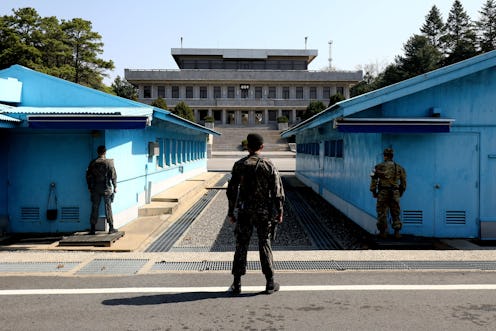News
This Is How Long North Korea Has Claimed It's Had Nukes

On Friday, North Korea announced its decision to halt nuclear and long-range missile testing in advance of a planned meeting between the country's leader, Kim Jong-un, and American president Donald Trump. The decision was announced on North Korean state television, and it helps set the stage for an eventual summit between the two leaders. But if you're not precisely familiar with the history of North Korea's time as a nuclear-armed state, you might be wondering: just how long has North Korea had nukes, and how exactly did it get them?
Unfortunately, precise dates about the origins of the country's nuclear weapons program can be difficult to pin down, owing to its isolated nature. What is known, however, is that North Korea first claimed possession of nuclear weapons back in 2003 ― just one year after then-president George W. Bush declared it a member of an "axis of evil" in his 2002 State of the Union address ― and conducted its first nuclear weapons test in 2006.
What this means, in simple terms, is that North Korea being in possession of nukes is nothing new. To the contrary, the world has been living with the reality of North Korea as a nuclear-armed state for more than a decade.
North Korea has also been making highly aggressive threats towards the United States and its allies for years ― this too is nothing new, even though it's gotten an immense amount of press in recent months. For more than a decade, North Korean has threatened to turn the U.S. and South Korea alike into a "sea of fire," but such threats are commonly understood to be performative, owing to the existential threat the country would immediately face if it ever actually used its weapons.
Trump has been unique among U.S. presidents, in that he's responded to North Korea's threats with similarly bombastic and aggressive rhetoric. Last year, in what was reportedly an improvised remark, Trump threatened that the U.S. would bring "fire and fury like the world has never seen." Also, in his first-ever address to the United Nations, Trump threatened to "totally destroy" North Korea if its nuclear and missile tests continued.
Despite some of its high-profile threats, North Korea has maintained that its nuclear weapons program is justified for the purposes of self-defense, stating in August of last year that it's a response to how the U.S. has "openly declared its hostile intentions" against the country. This is part of why many progressive observers decried Bush's 2002 declaration that North Korea was part of an "axis of evil," because it may have motivated the isolated country to acquire nuclear weapons as a backstop against American military action.
It remains to be seen when and where the planned summit between Trump and Kim takes place, although the news that North Korea is planning to suspend its nuclear and missile testing ― as well as close its nuclear testing site ― would be a tangible step towards that outcome. Trump himself voiced approval at the news on Friday, calling it "very good news."
"North Korea has agreed to suspend all Nuclear Tests and close up a major test site,” Trump tweeted. “This is very good news for North Korea and the World - big progress! Look forward to our Summit."
As CNBC detailed this week, there are a number of possible locations where the summit could be held, assuming both sides agree to meet in neutral territory. Some potential options that have been floated include Sweden, Switzerland, Finland, Mongolia, or Panmunjom, the so-called "truce village" at the demilitarized zone (DMZ) along the North Korean/South Korean border.